Personal & Professional Growth: Hotel Supervisor Development Plan
VerifiedAdded on 2024/06/03
|34
|4211
|133
Report
AI Summary
This report provides a comprehensive analysis of personal and professional development strategies for individuals in the service industry, specifically focusing on a hotel supervisor role at Shangri-La. It evaluates self-managed learning approaches, proposes methods for encouraging lifelong learning in both personal and professional contexts, and assesses the benefits of self-managed learning for individuals and organizations. The report includes a detailed personal and professional development plan, outlining specific skills to be developed, activities for improvement, and timelines for achieving goals. Furthermore, it discusses the procedures and activities needed for implementing the development plan, documents the development activities, reflects on learning against set objectives, and updates the plan based on feedback and evaluation. The report concludes with an individual presentation summarizing the key findings and recommendations for continuous personal and professional growth.

personal and professional
development
development
Paraphrase This Document
Need a fresh take? Get an instant paraphrase of this document with our AI Paraphraser

Table of Contents
INTRODUCTION...............................................................................................................2
TASK 1...............................................................................................................................3
LO1....................................................................................................................................3
1.1 EVALUATION OF SELF-MANAGED LEARNING APPROACHES.........................3
1.2 PROPOSING WAYS FOR ENCOURAGING LIFELONG LEARNING IN THE
PERSONAL AND PROFESSIONAL CONTEXT...........................................................6
1.3 EVALUATION OF BENEFITS OF SELF-MANAGED LEARNING FOR THE
PEOPLE AND ORGANIZATION....................................................................................8
TASK 2.............................................................................................................................10
LO2..................................................................................................................................10
2.4 PERSONAL AND PROFESSIONAL DEVELOPMENT PLAN...............................10
TASK 1.............................................................................................................................13
LO3..................................................................................................................................13
3.1 DISCUSSION ON THE PROCEDURE AND ACTIVITY NEEDED FOR
IMPLEMENTATION OF DEVELOPMENT PLAN........................................................13
3.2 DOCUMENTING THE DEVELOPMENT ACTIVITIES AS PER THE PLAN.........15
3.3 REFLECTING ON OWN LEARNING AGAINST THE AIMS AND OBJECTIVES
THAT WERE SET IN DEVELOPMENT PLAN............................................................16
3.4 UPDATING DEVELOPMENT PLAN ON THE BASIS OF FEEDBACK AND
EVALUATION..............................................................................................................18
TASK 3.............................................................................................................................19
LO4..................................................................................................................................19
INDIVIDUAL PRESENTATION.......................................................................................19
CONCLUSION.................................................................................................................31
sREFERENCES..............................................................................................................32
1
INTRODUCTION...............................................................................................................2
TASK 1...............................................................................................................................3
LO1....................................................................................................................................3
1.1 EVALUATION OF SELF-MANAGED LEARNING APPROACHES.........................3
1.2 PROPOSING WAYS FOR ENCOURAGING LIFELONG LEARNING IN THE
PERSONAL AND PROFESSIONAL CONTEXT...........................................................6
1.3 EVALUATION OF BENEFITS OF SELF-MANAGED LEARNING FOR THE
PEOPLE AND ORGANIZATION....................................................................................8
TASK 2.............................................................................................................................10
LO2..................................................................................................................................10
2.4 PERSONAL AND PROFESSIONAL DEVELOPMENT PLAN...............................10
TASK 1.............................................................................................................................13
LO3..................................................................................................................................13
3.1 DISCUSSION ON THE PROCEDURE AND ACTIVITY NEEDED FOR
IMPLEMENTATION OF DEVELOPMENT PLAN........................................................13
3.2 DOCUMENTING THE DEVELOPMENT ACTIVITIES AS PER THE PLAN.........15
3.3 REFLECTING ON OWN LEARNING AGAINST THE AIMS AND OBJECTIVES
THAT WERE SET IN DEVELOPMENT PLAN............................................................16
3.4 UPDATING DEVELOPMENT PLAN ON THE BASIS OF FEEDBACK AND
EVALUATION..............................................................................................................18
TASK 3.............................................................................................................................19
LO4..................................................................................................................................19
INDIVIDUAL PRESENTATION.......................................................................................19
CONCLUSION.................................................................................................................31
sREFERENCES..............................................................................................................32
1

INTRODUCTION
The individuals working in the service industry need to possess some skills that help
them to grow at the personal level and to excel in their professional life. The report will
be helpful for the individuals to become self-directed learners that give them confidence
and make them capable enough for managing the professional skills and the personal
traits they possess. This will help them to accomplish the desired goals and objectives
for career development.
In the report, hotel Shangri-La at Shard is taken into context where the methods of
learning will be taken into consideration along with the evaluation of own skills. Along
with this, a development plan will be made for the enhancement of personality of
individuals followed by a demonstration of the knowledge gained.
2
The individuals working in the service industry need to possess some skills that help
them to grow at the personal level and to excel in their professional life. The report will
be helpful for the individuals to become self-directed learners that give them confidence
and make them capable enough for managing the professional skills and the personal
traits they possess. This will help them to accomplish the desired goals and objectives
for career development.
In the report, hotel Shangri-La at Shard is taken into context where the methods of
learning will be taken into consideration along with the evaluation of own skills. Along
with this, a development plan will be made for the enhancement of personality of
individuals followed by a demonstration of the knowledge gained.
2
⊘ This is a preview!⊘
Do you want full access?
Subscribe today to unlock all pages.

Trusted by 1+ million students worldwide
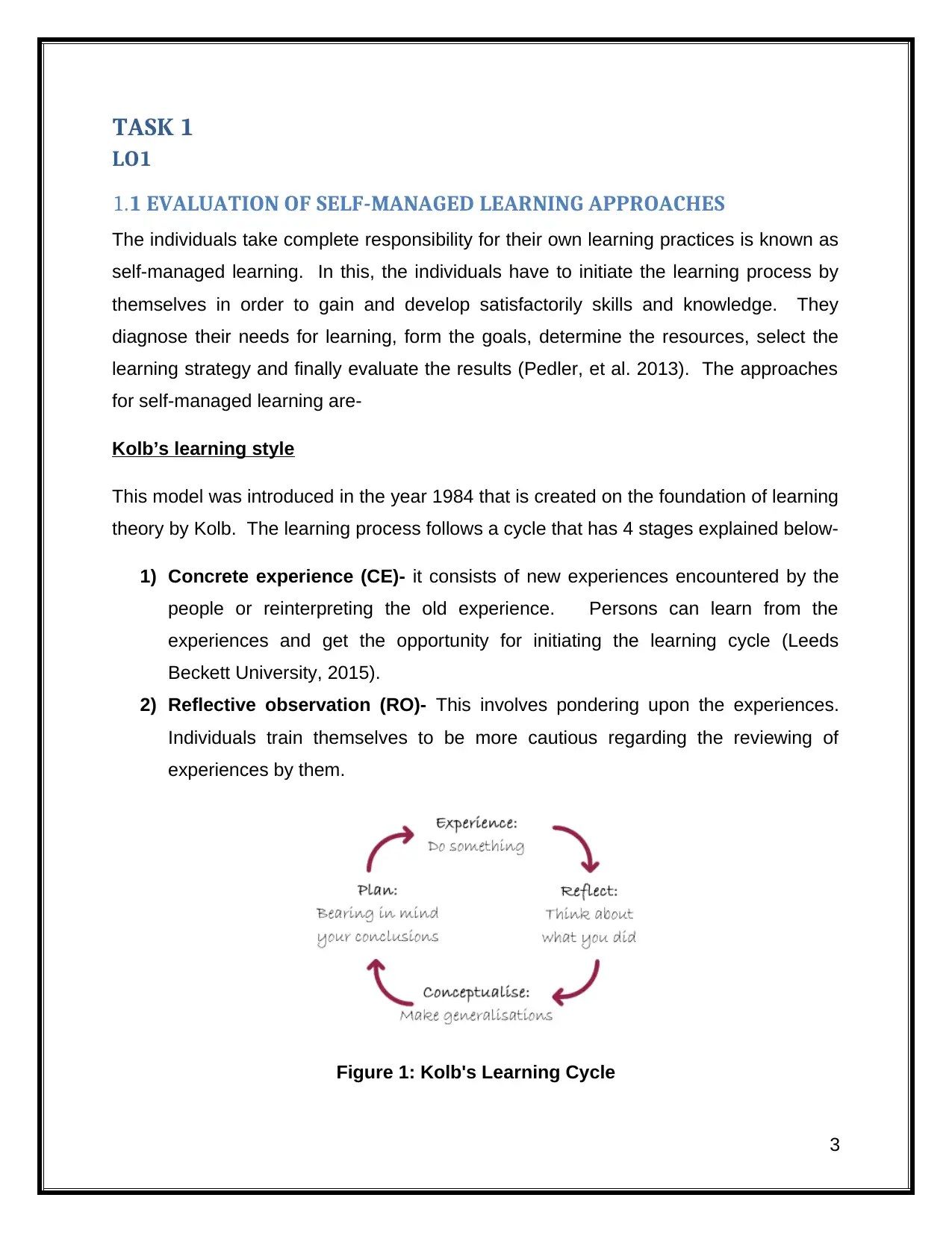
TASK 1
LO1
1.1 EVALUATION OF SELF-MANAGED LEARNING APPROACHES
The individuals take complete responsibility for their own learning practices is known as
self-managed learning. In this, the individuals have to initiate the learning process by
themselves in order to gain and develop satisfactorily skills and knowledge. They
diagnose their needs for learning, form the goals, determine the resources, select the
learning strategy and finally evaluate the results (Pedler, et al. 2013). The approaches
for self-managed learning are-
Kolb’s learning style
This model was introduced in the year 1984 that is created on the foundation of learning
theory by Kolb. The learning process follows a cycle that has 4 stages explained below-
1) Concrete experience (CE)- it consists of new experiences encountered by the
people or reinterpreting the old experience. Persons can learn from the
experiences and get the opportunity for initiating the learning cycle (Leeds
Beckett University, 2015).
2) Reflective observation (RO)- This involves pondering upon the experiences.
Individuals train themselves to be more cautious regarding the reviewing of
experiences by them.
Figure 1: Kolb's Learning Cycle
3
LO1
1.1 EVALUATION OF SELF-MANAGED LEARNING APPROACHES
The individuals take complete responsibility for their own learning practices is known as
self-managed learning. In this, the individuals have to initiate the learning process by
themselves in order to gain and develop satisfactorily skills and knowledge. They
diagnose their needs for learning, form the goals, determine the resources, select the
learning strategy and finally evaluate the results (Pedler, et al. 2013). The approaches
for self-managed learning are-
Kolb’s learning style
This model was introduced in the year 1984 that is created on the foundation of learning
theory by Kolb. The learning process follows a cycle that has 4 stages explained below-
1) Concrete experience (CE)- it consists of new experiences encountered by the
people or reinterpreting the old experience. Persons can learn from the
experiences and get the opportunity for initiating the learning cycle (Leeds
Beckett University, 2015).
2) Reflective observation (RO)- This involves pondering upon the experiences.
Individuals train themselves to be more cautious regarding the reviewing of
experiences by them.
Figure 1: Kolb's Learning Cycle
3
Paraphrase This Document
Need a fresh take? Get an instant paraphrase of this document with our AI Paraphraser

Source: [Leeds Beckett University, 2015]
3) Abstract conceptualization (AC) - New ideas are produced and a hypothesis is
made to comprehend the meaning of experiences.
4) Active experimentation (AE) - this involves testing the hypothesis where the
new experiences gained will provide support or challenge the hypothesis (Leeds
Beckett University, 2015).
Kolb has developed four styles of learning-
1) Diverging involves the gaining of concrete experiences and conducting reflective
observation (Barker, et al. 2016)
2) Assimilating in which observation and thinking take place which involves
reflective observation and AC (abstract conceptualization).
3) Converging undertakes AE (active experimentation) and AC (abstract
conceptualization).
4) Accommodating style comprises of doing and feeling which includes gaining
concrete experience and AE (active experimentation).
Honey and Mumford
This style was developed in the year 1986 that is inspired from the Kolb’s model.
Figure 2: Honey and Mumford
Source: [HectaCon, 2015]
4
3) Abstract conceptualization (AC) - New ideas are produced and a hypothesis is
made to comprehend the meaning of experiences.
4) Active experimentation (AE) - this involves testing the hypothesis where the
new experiences gained will provide support or challenge the hypothesis (Leeds
Beckett University, 2015).
Kolb has developed four styles of learning-
1) Diverging involves the gaining of concrete experiences and conducting reflective
observation (Barker, et al. 2016)
2) Assimilating in which observation and thinking take place which involves
reflective observation and AC (abstract conceptualization).
3) Converging undertakes AE (active experimentation) and AC (abstract
conceptualization).
4) Accommodating style comprises of doing and feeling which includes gaining
concrete experience and AE (active experimentation).
Honey and Mumford
This style was developed in the year 1986 that is inspired from the Kolb’s model.
Figure 2: Honey and Mumford
Source: [HectaCon, 2015]
4
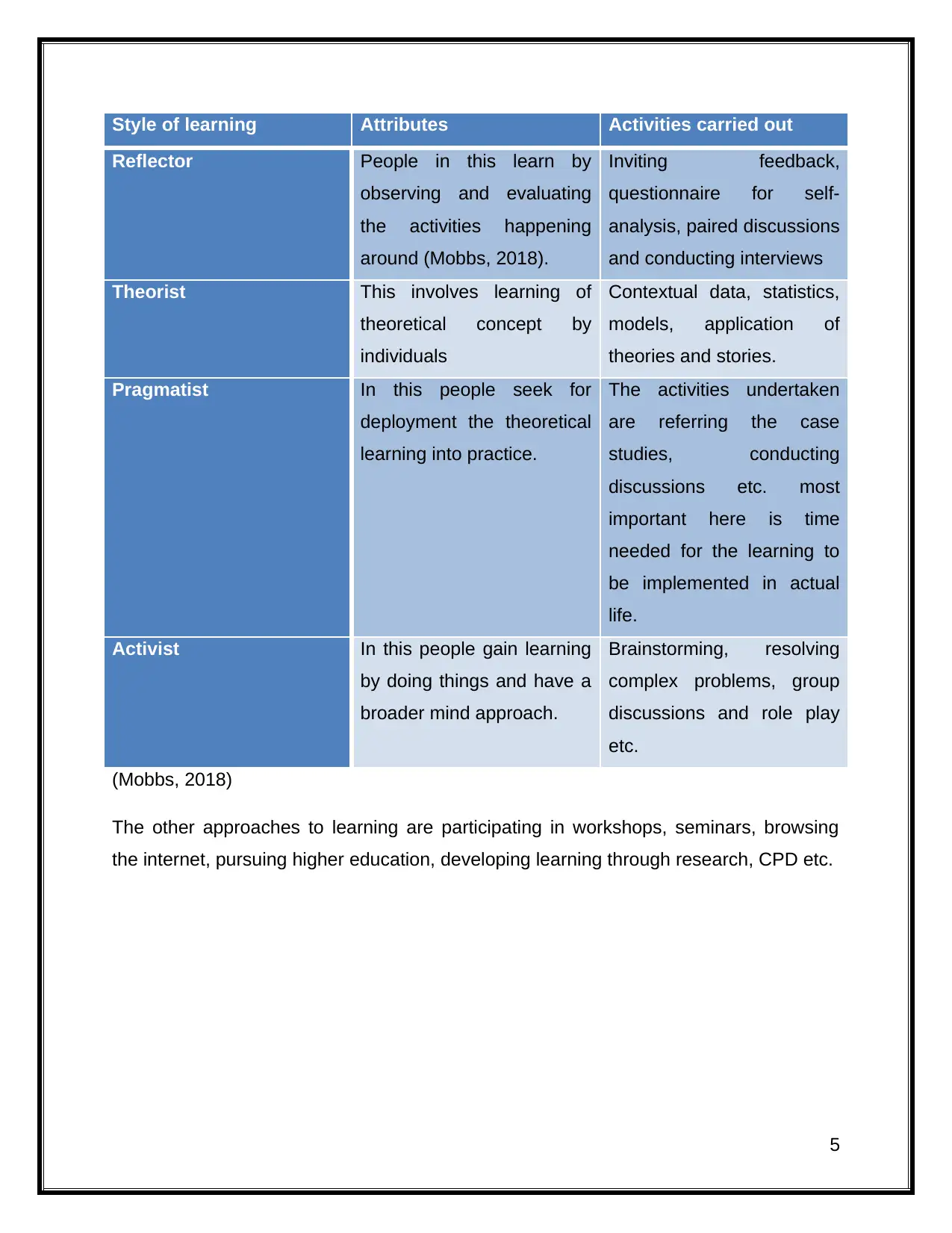
Style of learning Attributes Activities carried out
Reflector People in this learn by
observing and evaluating
the activities happening
around (Mobbs, 2018).
Inviting feedback,
questionnaire for self-
analysis, paired discussions
and conducting interviews
Theorist This involves learning of
theoretical concept by
individuals
Contextual data, statistics,
models, application of
theories and stories.
Pragmatist In this people seek for
deployment the theoretical
learning into practice.
The activities undertaken
are referring the case
studies, conducting
discussions etc. most
important here is time
needed for the learning to
be implemented in actual
life.
Activist In this people gain learning
by doing things and have a
broader mind approach.
Brainstorming, resolving
complex problems, group
discussions and role play
etc.
(Mobbs, 2018)
The other approaches to learning are participating in workshops, seminars, browsing
the internet, pursuing higher education, developing learning through research, CPD etc.
5
Reflector People in this learn by
observing and evaluating
the activities happening
around (Mobbs, 2018).
Inviting feedback,
questionnaire for self-
analysis, paired discussions
and conducting interviews
Theorist This involves learning of
theoretical concept by
individuals
Contextual data, statistics,
models, application of
theories and stories.
Pragmatist In this people seek for
deployment the theoretical
learning into practice.
The activities undertaken
are referring the case
studies, conducting
discussions etc. most
important here is time
needed for the learning to
be implemented in actual
life.
Activist In this people gain learning
by doing things and have a
broader mind approach.
Brainstorming, resolving
complex problems, group
discussions and role play
etc.
(Mobbs, 2018)
The other approaches to learning are participating in workshops, seminars, browsing
the internet, pursuing higher education, developing learning through research, CPD etc.
5
⊘ This is a preview!⊘
Do you want full access?
Subscribe today to unlock all pages.

Trusted by 1+ million students worldwide

1.2 PROPOSING WAYS FOR ENCOURAGING LIFELONG LEARNING IN THE
PERSONAL AND PROFESSIONAL CONTEXT
The voluntary, self-motivated and an ongoing pursuit of information is termed as
lifelong learning. For the process of lifelong learning, the two theories incorporated are
constructivism which states that knowledge is built by persons and not gained from the
world and the Gestalt which says that learning can be done by developing relationship
amid new and old (Hamlyn, 2017).
In the professional context
The companies can offer aid and reimbursement for the college tuition fees for
higher education to the employees. This makes them sustain with the firm for a
longer time.
Providing encouragement and reimbursement to the employees for their
attentiveness to the ongoing learning process. This enhances their professional
development (Jackson, 2015).
The learning goals and the overall goals may be intertwined which will motivate
the workforce for seeking learning opportunities and aid in the development of
learning culture in the company. For instance, motivating individuals for attending
worships and asking them to devote 2 hours every week in the learning process.
Lunch and learn can be frequently hosted by the companies which include the
workshops to be attended by employees followed by lunch.
Starting an office library is a good initiative for promotion of ongoing formal
learning.
Sharing of the learning results with other employees will encourage them to pay
more attention towards the learning process (Nisbet and Shucksmith, 2017).
In the personal context
Self-managed learning is a good approach which will encourage the people to
adopt the learning approach. It helps in getting motivation for lifelong learning
(Davis, 2011).
6
PERSONAL AND PROFESSIONAL CONTEXT
The voluntary, self-motivated and an ongoing pursuit of information is termed as
lifelong learning. For the process of lifelong learning, the two theories incorporated are
constructivism which states that knowledge is built by persons and not gained from the
world and the Gestalt which says that learning can be done by developing relationship
amid new and old (Hamlyn, 2017).
In the professional context
The companies can offer aid and reimbursement for the college tuition fees for
higher education to the employees. This makes them sustain with the firm for a
longer time.
Providing encouragement and reimbursement to the employees for their
attentiveness to the ongoing learning process. This enhances their professional
development (Jackson, 2015).
The learning goals and the overall goals may be intertwined which will motivate
the workforce for seeking learning opportunities and aid in the development of
learning culture in the company. For instance, motivating individuals for attending
worships and asking them to devote 2 hours every week in the learning process.
Lunch and learn can be frequently hosted by the companies which include the
workshops to be attended by employees followed by lunch.
Starting an office library is a good initiative for promotion of ongoing formal
learning.
Sharing of the learning results with other employees will encourage them to pay
more attention towards the learning process (Nisbet and Shucksmith, 2017).
In the personal context
Self-managed learning is a good approach which will encourage the people to
adopt the learning approach. It helps in getting motivation for lifelong learning
(Davis, 2011).
6
Paraphrase This Document
Need a fresh take? Get an instant paraphrase of this document with our AI Paraphraser
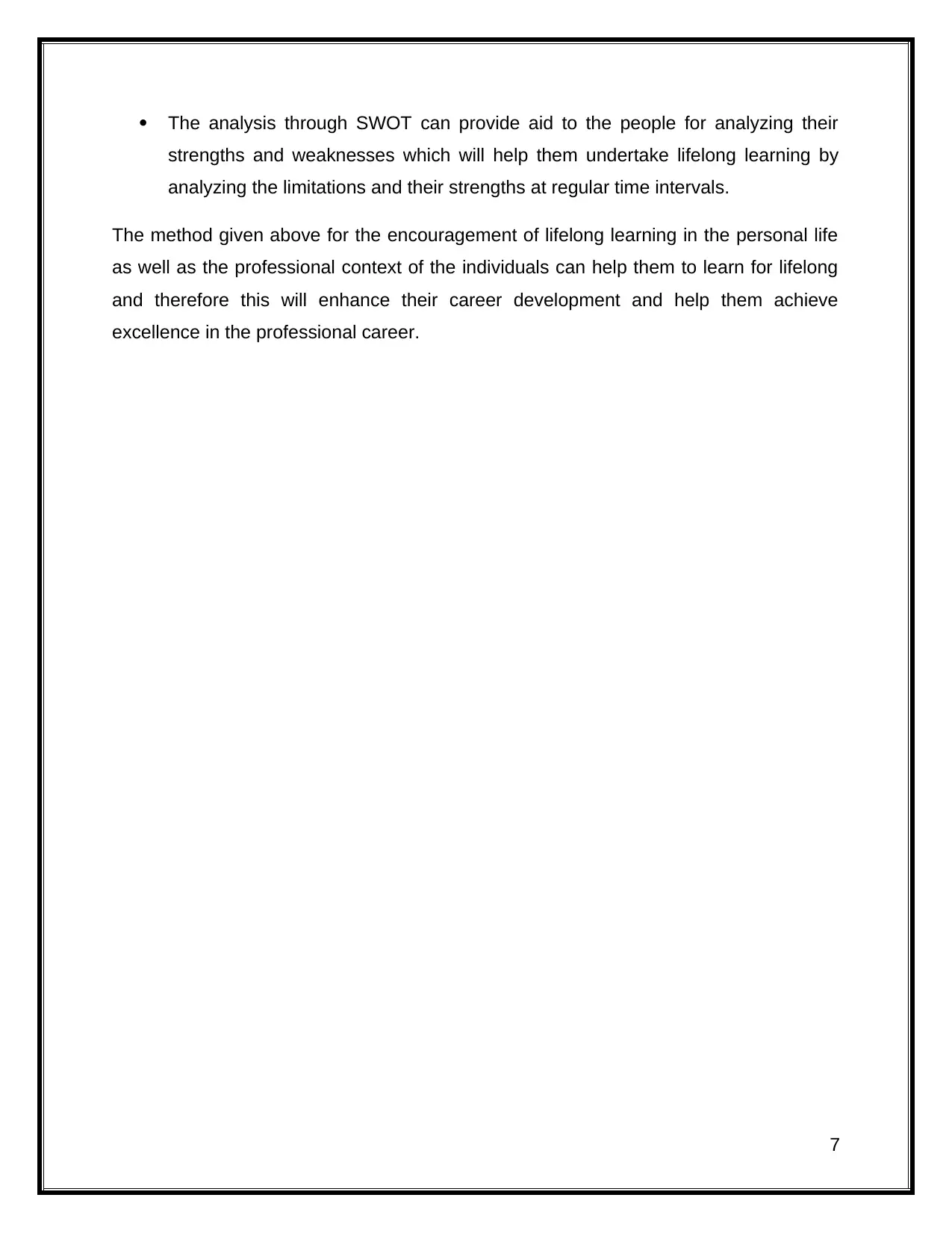
The analysis through SWOT can provide aid to the people for analyzing their
strengths and weaknesses which will help them undertake lifelong learning by
analyzing the limitations and their strengths at regular time intervals.
The method given above for the encouragement of lifelong learning in the personal life
as well as the professional context of the individuals can help them to learn for lifelong
and therefore this will enhance their career development and help them achieve
excellence in the professional career.
7
strengths and weaknesses which will help them undertake lifelong learning by
analyzing the limitations and their strengths at regular time intervals.
The method given above for the encouragement of lifelong learning in the personal life
as well as the professional context of the individuals can help them to learn for lifelong
and therefore this will enhance their career development and help them achieve
excellence in the professional career.
7

1.3 EVALUATION OF BENEFITS OF SELF-MANAGED LEARNING FOR THE
PEOPLE AND ORGANIZATION
The major benefit of learning through self-management is that it provides a lot of aid in
developing self-esteem and also boosting the level of confidence in the people. The
growth of skills and knowledge in people gives the opportunity to them to excel in the
social life and outshine at the cultural level in the society as well as their workplace
(Cunningham, 2017). This helps in good maintenance of the pride and prestige of
individuals which gives new prospects to their career progression. One more benefit is
that it provides aid in exploration and application of the latest technologies to work for
the people and this is implemented in the rewards and recognition schemes (Cottrell,
2015).
Figure 3: Advantages of self-managed learning
The other benefits offered to the people through self-managed learning (SML) are self-
resilience, comprehension of certain skill set, meeting the objectives and presented
challenges, developing self-awareness, building the skill to deal patiently with ambiguity
and self-conscience. It also helps the individuals to get knowledge about the learning
8
Benfit to the
business
Better independent
working
Better creativeness and
initiative
Better decision making
skills
Common to both
Better communictaion
skills
Good leadership qualities
Raised motivation and
aspiration
Better Organisational
skills
Benefit to
individuals
Increased confidence
Permitting personalised
range of learning
Deveopment of Self
confidence and
empowerment
PEOPLE AND ORGANIZATION
The major benefit of learning through self-management is that it provides a lot of aid in
developing self-esteem and also boosting the level of confidence in the people. The
growth of skills and knowledge in people gives the opportunity to them to excel in the
social life and outshine at the cultural level in the society as well as their workplace
(Cunningham, 2017). This helps in good maintenance of the pride and prestige of
individuals which gives new prospects to their career progression. One more benefit is
that it provides aid in exploration and application of the latest technologies to work for
the people and this is implemented in the rewards and recognition schemes (Cottrell,
2015).
Figure 3: Advantages of self-managed learning
The other benefits offered to the people through self-managed learning (SML) are self-
resilience, comprehension of certain skill set, meeting the objectives and presented
challenges, developing self-awareness, building the skill to deal patiently with ambiguity
and self-conscience. It also helps the individuals to get knowledge about the learning
8
Benfit to the
business
Better independent
working
Better creativeness and
initiative
Better decision making
skills
Common to both
Better communictaion
skills
Good leadership qualities
Raised motivation and
aspiration
Better Organisational
skills
Benefit to
individuals
Increased confidence
Permitting personalised
range of learning
Deveopment of Self
confidence and
empowerment
⊘ This is a preview!⊘
Do you want full access?
Subscribe today to unlock all pages.

Trusted by 1+ million students worldwide
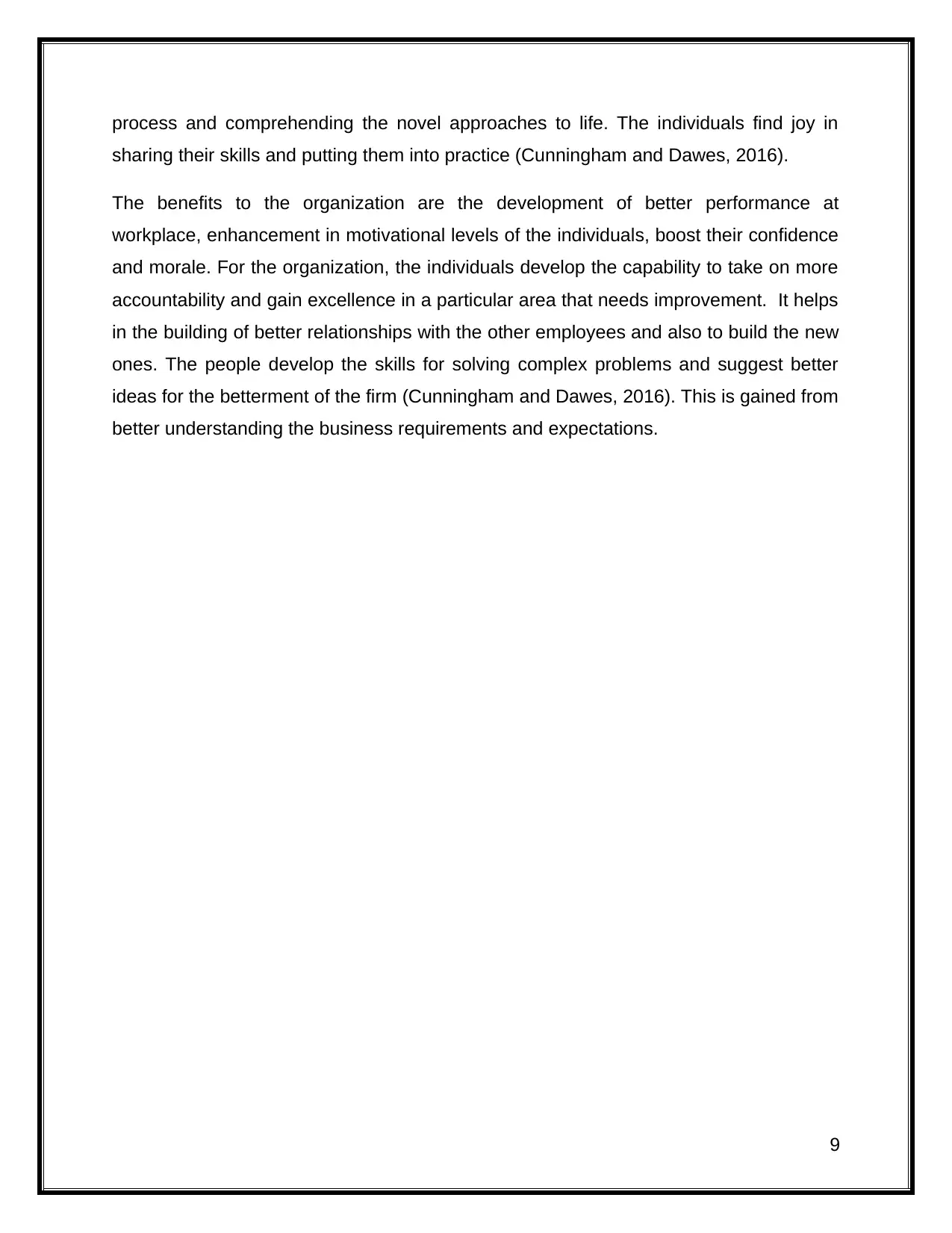
process and comprehending the novel approaches to life. The individuals find joy in
sharing their skills and putting them into practice (Cunningham and Dawes, 2016).
The benefits to the organization are the development of better performance at
workplace, enhancement in motivational levels of the individuals, boost their confidence
and morale. For the organization, the individuals develop the capability to take on more
accountability and gain excellence in a particular area that needs improvement. It helps
in the building of better relationships with the other employees and also to build the new
ones. The people develop the skills for solving complex problems and suggest better
ideas for the betterment of the firm (Cunningham and Dawes, 2016). This is gained from
better understanding the business requirements and expectations.
9
sharing their skills and putting them into practice (Cunningham and Dawes, 2016).
The benefits to the organization are the development of better performance at
workplace, enhancement in motivational levels of the individuals, boost their confidence
and morale. For the organization, the individuals develop the capability to take on more
accountability and gain excellence in a particular area that needs improvement. It helps
in the building of better relationships with the other employees and also to build the new
ones. The people develop the skills for solving complex problems and suggest better
ideas for the betterment of the firm (Cunningham and Dawes, 2016). This is gained from
better understanding the business requirements and expectations.
9
Paraphrase This Document
Need a fresh take? Get an instant paraphrase of this document with our AI Paraphraser
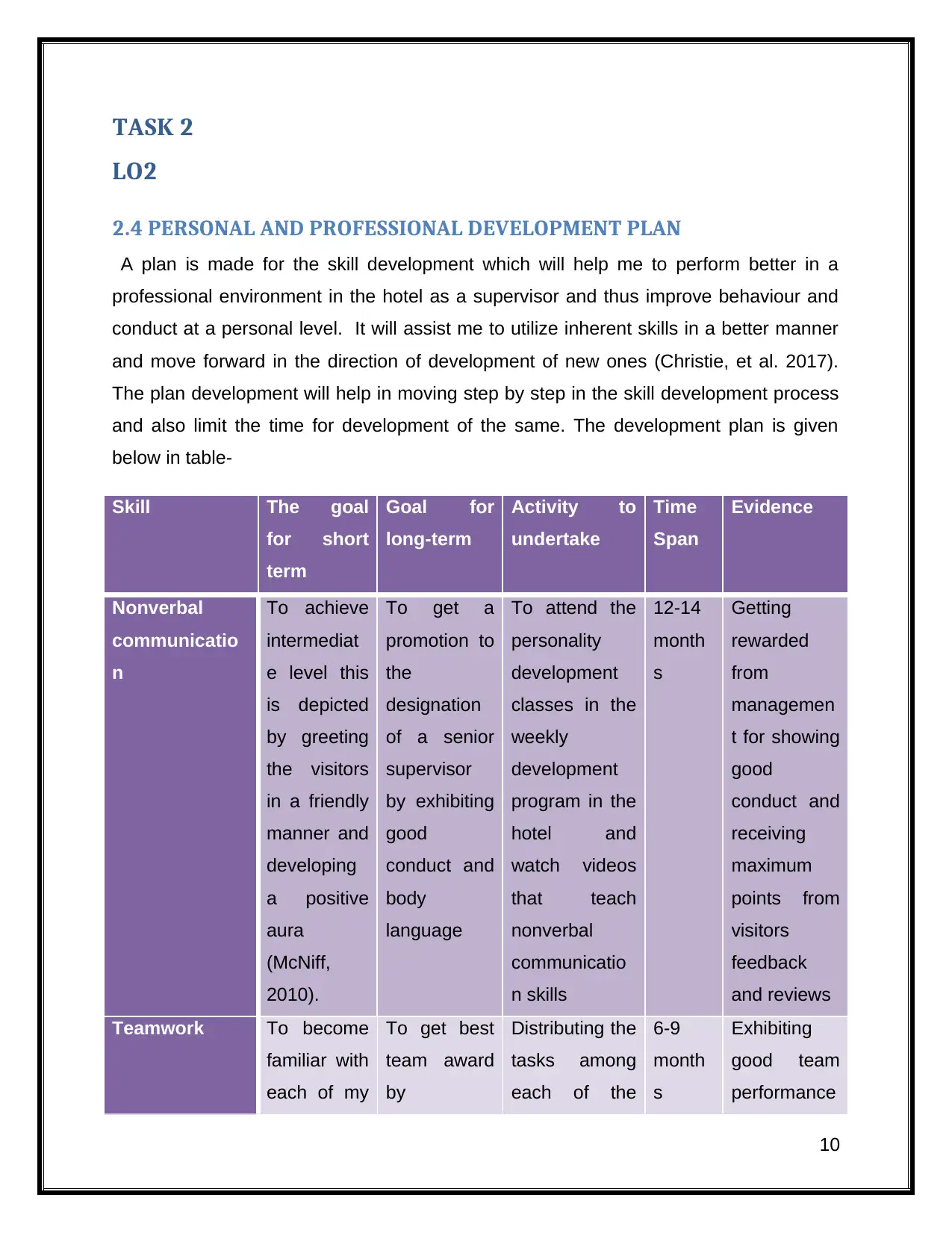
TASK 2
LO2
2.4 PERSONAL AND PROFESSIONAL DEVELOPMENT PLAN
A plan is made for the skill development which will help me to perform better in a
professional environment in the hotel as a supervisor and thus improve behaviour and
conduct at a personal level. It will assist me to utilize inherent skills in a better manner
and move forward in the direction of development of new ones (Christie, et al. 2017).
The plan development will help in moving step by step in the skill development process
and also limit the time for development of the same. The development plan is given
below in table-
Skill The goal
for short
term
Goal for
long-term
Activity to
undertake
Time
Span
Evidence
Nonverbal
communicatio
n
To achieve
intermediat
e level this
is depicted
by greeting
the visitors
in a friendly
manner and
developing
a positive
aura
(McNiff,
2010).
To get a
promotion to
the
designation
of a senior
supervisor
by exhibiting
good
conduct and
body
language
To attend the
personality
development
classes in the
weekly
development
program in the
hotel and
watch videos
that teach
nonverbal
communicatio
n skills
12-14
month
s
Getting
rewarded
from
managemen
t for showing
good
conduct and
receiving
maximum
points from
visitors
feedback
and reviews
Teamwork To become
familiar with
each of my
To get best
team award
by
Distributing the
tasks among
each of the
6-9
month
s
Exhibiting
good team
performance
10
LO2
2.4 PERSONAL AND PROFESSIONAL DEVELOPMENT PLAN
A plan is made for the skill development which will help me to perform better in a
professional environment in the hotel as a supervisor and thus improve behaviour and
conduct at a personal level. It will assist me to utilize inherent skills in a better manner
and move forward in the direction of development of new ones (Christie, et al. 2017).
The plan development will help in moving step by step in the skill development process
and also limit the time for development of the same. The development plan is given
below in table-
Skill The goal
for short
term
Goal for
long-term
Activity to
undertake
Time
Span
Evidence
Nonverbal
communicatio
n
To achieve
intermediat
e level this
is depicted
by greeting
the visitors
in a friendly
manner and
developing
a positive
aura
(McNiff,
2010).
To get a
promotion to
the
designation
of a senior
supervisor
by exhibiting
good
conduct and
body
language
To attend the
personality
development
classes in the
weekly
development
program in the
hotel and
watch videos
that teach
nonverbal
communicatio
n skills
12-14
month
s
Getting
rewarded
from
managemen
t for showing
good
conduct and
receiving
maximum
points from
visitors
feedback
and reviews
Teamwork To become
familiar with
each of my
To get best
team award
by
Distributing the
tasks among
each of the
6-9
month
s
Exhibiting
good team
performance
10
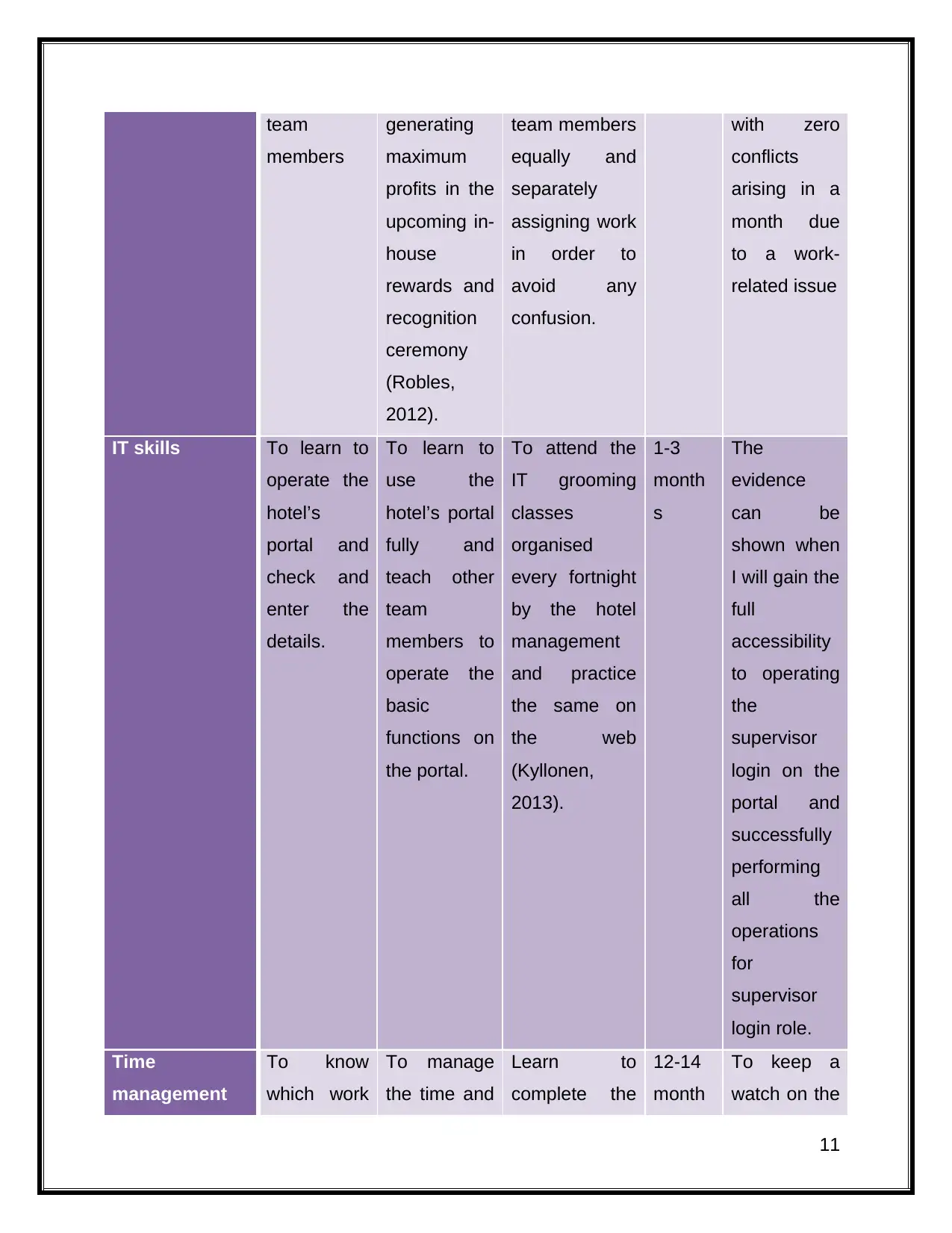
team
members
generating
maximum
profits in the
upcoming in-
house
rewards and
recognition
ceremony
(Robles,
2012).
team members
equally and
separately
assigning work
in order to
avoid any
confusion.
with zero
conflicts
arising in a
month due
to a work-
related issue
IT skills To learn to
operate the
hotel’s
portal and
check and
enter the
details.
To learn to
use the
hotel’s portal
fully and
teach other
team
members to
operate the
basic
functions on
the portal.
To attend the
IT grooming
classes
organised
every fortnight
by the hotel
management
and practice
the same on
the web
(Kyllonen,
2013).
1-3
month
s
The
evidence
can be
shown when
I will gain the
full
accessibility
to operating
the
supervisor
login on the
portal and
successfully
performing
all the
operations
for
supervisor
login role.
Time
management
To know
which work
To manage
the time and
Learn to
complete the
12-14
month
To keep a
watch on the
11
members
generating
maximum
profits in the
upcoming in-
house
rewards and
recognition
ceremony
(Robles,
2012).
team members
equally and
separately
assigning work
in order to
avoid any
confusion.
with zero
conflicts
arising in a
month due
to a work-
related issue
IT skills To learn to
operate the
hotel’s
portal and
check and
enter the
details.
To learn to
use the
hotel’s portal
fully and
teach other
team
members to
operate the
basic
functions on
the portal.
To attend the
IT grooming
classes
organised
every fortnight
by the hotel
management
and practice
the same on
the web
(Kyllonen,
2013).
1-3
month
s
The
evidence
can be
shown when
I will gain the
full
accessibility
to operating
the
supervisor
login on the
portal and
successfully
performing
all the
operations
for
supervisor
login role.
Time
management
To know
which work
To manage
the time and
Learn to
complete the
12-14
month
To keep a
watch on the
11
⊘ This is a preview!⊘
Do you want full access?
Subscribe today to unlock all pages.

Trusted by 1+ million students worldwide
1 out of 34
Related Documents
Your All-in-One AI-Powered Toolkit for Academic Success.
+13062052269
info@desklib.com
Available 24*7 on WhatsApp / Email
![[object Object]](/_next/static/media/star-bottom.7253800d.svg)
Unlock your academic potential
Copyright © 2020–2026 A2Z Services. All Rights Reserved. Developed and managed by ZUCOL.


